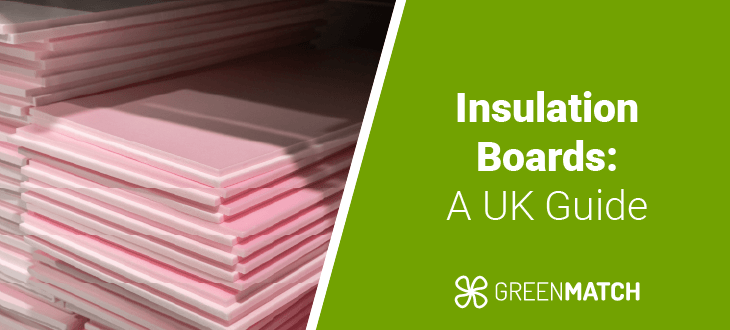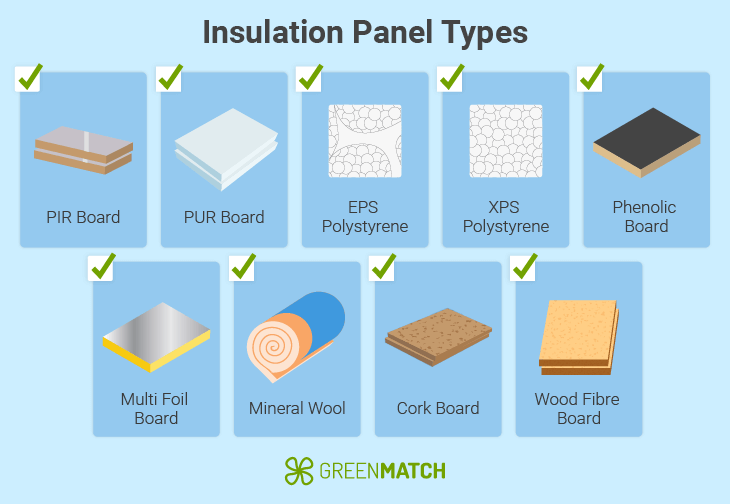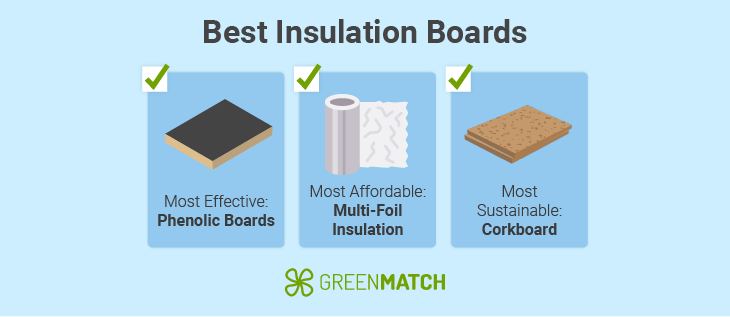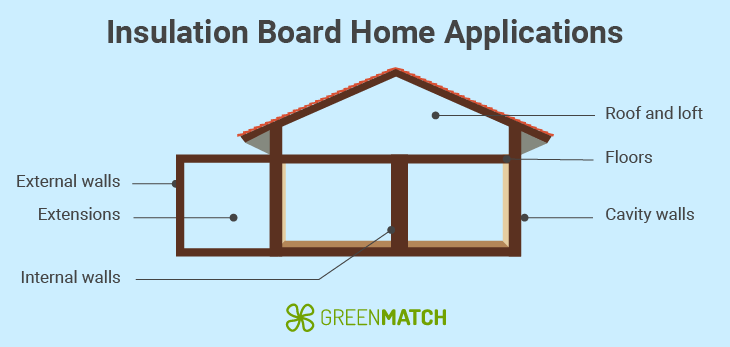Answer these simple questions and we will find you the BEST prices
Which type of solar quotes do you need?
It only takes 30 seconds
100% free with no obligation

Get Free quotes from insulation specialists near you

Save money by comparing quotes and choosing the most competitive offer

The service is 100% free and with no obligation
- GreenMatch
- Insulation
- Board Insulation
A Complete Guide to Insulation Boards (2025)

- The most popular insulation board is PIR, made from synthetic polyisocyanurate, however, there is a wide range of eco-alternatives on the market too.
- Depending on the type of insulation material chosen, insulation boards can average cost between £10 - £22 per m2.
- Rigid board insulation is popular for its strength, durability against weathering, and superior resistance to moisture, mould and rot.
The UK has some of Europe's most poorly insulated housing, responsible for a staggering 27% of national CO2 emissions. With the ambitious Net Zero by 2050 goal in place, home insulation materials have never been so important.
Insulation boards, lauded for their high heat retention, durability, and resistance to weathering, are a booming market for all the right reasons. From synthetic PIR to all-natural cork, there are plenty of effective options for all budgets, purposes, and applications.
This complete guide by GreenMatch UK will provide you with all the information you need to make the right insulation decisions for your home.
Ready to insulate your home? Look no further than GreeMatch UK for a one-stop solution to all your insulation needs. Instead of spending endless hours online, spend just 30 seconds filling out our intake form and receive up to 3 home-tailored quotes, completely free of charges and obligations. Click below to begin!
- Describe your needs
- Get free quotes
- Choose the best offer
It only takes 30 seconds



What are insulation boards?
Simply put, insulation boards are dense and rigid panels or sheets made from various thermally efficient materials. Depending on the chosen materials and their density, insulation boards can provide a varying degree of thermal effectiveness.
Insulating boards are most commonly made of synthetic polymers such as polyisocyanurate (PIR) or polystyrene (EPS), but there are also plenty of eco-friendly and sustainable options.
Types of insulation panels

Luckily, there is a near-endless range of various insulation panels on the market, tailored to all kinds of budgets and applications. Here’s a summary of some of the most popular insulation boards available on the market today:
- PIR board: Polyisocyanurate boards cost around £5 – £15 per m2, and are one of the most popular choices due to their unrivalled thermal efficiency. PIR exhibits an impressive u-value of 0.022 - 0.028 W/m²K and is relatively sustainable due to zero ozone depletion and low global warming potential. However, they are difficult to recycle and cannot be discarded as bio-waste.
- PUR board: Polyurethane foam insulation panels cost around £5 – £15 per m2 and are another popular material choice. While slightly less effective and sustainable than PIR at thermal retention, a PUR foam insulation panel is notoriously robust and can often last a building's lifetime. They are also resistant to moisture, mould, and rot.
- EPS polystyrene board: Expanded polystyrene boards cost around £10 per m2, making them budget-friendly yet highly effective at heat retention. They’re water resistant, yet vapour permeable, allowing for moisture to evaporate successfully, thus keeping your home and insulation dry.
- XPS polystyrene board: Extruded polystyrene boards cost around £5 - £11 per m2. They are a high-performing thermal insulation board with a closed-cell structure, making them impervious to moisture. They tend to be more durable than their EPS polystyrene counterparts and will often cost more.
- Phenolic board: Phenolic insulation is a rigid type of insulating board with a 95% or more closed-cell structure, making it nearly impervious to moisture. Phenolic insulation is most applauded for its flame and fire resistance, and can sometimes provide slightly better thermal efficiency than even PIR boards.
- Multi-foil board: These insulation foam panels are made from multiple aluminium layers bonded with foam insulation in between, costing an affordable £3 - £4 per m2. While not as effective at heat retention, its affordability makes it an appealing choice.
- Mineral wool: Made from natural or recycled rock or glass products, mineral wool thermal insulation boards cost around £13 - £17.5 per m2. This is a very common and popular insulation material due to its ease of production, thermal effectiveness, and versatility. It also exhibits flame, smoke and mould resistance.
- Corkboard: These all-natural and eco-friendly boards cost around £17 - £22 per m2, and boast a remarkable thermal performance. In addition, they’re very durable, flame and mould-resistant, and entirely biodegradable, making them one of the most sustainable insulation boards on the market.
- Wood fibre board: Made from compressed sawdust and costing around £12 - £24 per m2, wood fibre insulation boards are a sustainable, thermally effective, and breathable insulation material. Due to their micro-porous nature, they're uniquely successful in drying out moisture and reducing condensation.
In addition to the importance of your chosen insulated board, it’s just as vital to work with a professional installer. While DIY insulation may seem financially tempting, shabby work is a fine line between saving a quick buck and creating a financial nightmare full of repairs. GreenMatch UK can help you here.
Instead of spending endless hours surfing the web and scheduling phone calls, spend just 30 seconds filling out our online form and receive up to 3 free home-tailored quotes from our network of installers. No costs, no obligations. Simply click below to begin!
- Describe your needs
- Get free quotes
- Choose the best offer
It only takes 30 seconds



Which board is best for insulation?

The best board insulation would likely be phenolic boards, due to their superior heat retention capacity, exhibiting a remarkable u-value of 0.018 W/m²K. This is closely followed by PIR boards, which are also very thermally effective, demonstrating a u-value range of around 0.022 - 0.028 W/m²K.
However, the best board is a subjective matter that hinges on which factors matter the most to you, such as cost or sustainability. To make things easier, here’s a look at some other best boards on the market:
- Most affordable: Multi-foil insulation is likely the most affordable option on the market these days. Costing only £3 - £4 per m2, this handy material is made from multiple aluminium layers bonded with foam insulation.
- Most sustainable: Corkboard and wood fibre insulation boards are considered to be some of the most sustainable insulation boards on the market. Both are manufactured largely using recycled materials, are entirely hypoallergenic, and even biodegradable upon disposal.
For the most educated decision, it’s best to consult with an industry professional who can assess your property and help tailor the best course of action for your needs.
Applications of insulation boards

The greatest aspect of insulation boards is their durability, making them ideal insulation solutions for a range of jobs around the house. Here’s a breakdown of some key home projects for insulation boards that are well-suited for:
- External walls: A rigid foam insulation board is a perfect fit for external wall insulation due to its moisture resistance and durability against weathering. Upon fastening the boards, they must be covered with cladding to ensure long-term effectiveness.
- Internal walls: Likewise, rigid insulation boards can be fitted in between stud walls, acting as an effective insulator and even vapour barrier depending on your chosen material.
- Cavity walls: Manufacturers also produce tailored insulation boards for cavity wall purposes, most commonly found as a 100mm PIR cavity wall insulation board, as well as polystyrene, cork and other alternatives.
- Roof and loft: Rigid insulation boards can be easily cut for a snug fit between loft floor joists and roof rafters, providing unparalleled insulation and even increasing the structural integrity of your roof.
- Floors: Suspended timber floors can easily be fitted with rigid insulation boards. In addition, solid concrete floors can have insulation boards laid on top and covered with flooring for a seamless and effective finish.
- Extensions: Further home additions, such as a conservatory, sheds, kitchen and bathroom extensions can all be fitted with rigid foam insulation boards on the floor, walls and roof structures.
To make the most optimal decisions for your home, consider hiring a professional insulation installer to assess your property and construct the best course of action for your needs. With GreenMatch UK, all you need is 30 seconds.
Fill out our quick and easy online form to receive up to 3 free home-tailored quotes from our nationwide network of pre-vetted installers. No costs, no obligations. Simply click below to begin, and let the bargains come to you!
- Describe your needs
- Get free quotes
- Choose the best offer
It only takes 30 seconds



How much do insulation boards cost?
The cost of insulation boards can vary depending on your chosen material, its thickness, thermal efficiency and much more. The average cost range for insulation boards is about £3 - £25 per m2, but this can vary significantly.
Here’s a breakdown of costs per m2 based on your chosen insulation board type:
| Insulation material | Cost per m2 (£) |
|---|---|
| PIR board | £5 – £15 |
| PUR board | £5 – £15 |
| EPS polystyrene | £10 |
| XPS polystyrene | £5 - £11 |
| Phenolic board | - |
| Multi-foil board | £3 - £4 |
| Mineral wool | £13 - £17.5 |
| Corkboard | £17 - £22 |
| Wood fibre board | £12 - £24 |
Of all the insulation materials covered, multi-foil insulation boards are by far the cheapest home insulation option, however, it's important to note that multi-foil alone will not provide adequate thermal heat retention, and will need to be coupled with other insulation methods.
Several factors can impact your overall costs that are worth keeping in mind:
- Home condition: Homes with unaddressed issues and outstanding repairs will require maintenance work before insulation can be placed. This includes sealing off gaps, cracks and openings, relocating wiring, clearing debris and much more, adding to your overall costs.
- Insulation thickness: On average you need about 270mm of mineral wool insulation for successful heat retention. Conversely, you only need about 120mm of PIR or other foam panel insulation for the same results. Therefore, the thickness of the material you need will impact your costs.
- Existing insulation: If your home has old outdated insulation in place that needs removing, this will increase your costs. Alternatively, if your existing insulation is healthy but insufficient, you may be able to get away with top-up insulation that is much cheaper.
To make the best decision for your home, we recommend working with a professional installer. That way, a home assessment can be carried out to determine the best course of action tailored to your home.
How thick should panels be?
In general, most rigid panel insulation will require to be around 100mm - 120mm thick to meet UK Building Regulations for heat retention. This is significantly less than what is expected for blanket-style insulation such as mineral wool, which is at about 270mm for optimal insulation.
Ultimately, each property and its conditions will influence what thickness is needed. For this reason, it’s recommended to work with a professional insulation installer who can assess your property and tailor the best course of action to meet your needs.
Pros and cons of insulation panels
To make the most educated decision, it’s important to weigh out the pros and cons of your chosen insulation material. To make things easier, we’ve summarised the key advantages and disadvantages associated with rigid insulation panels for you:
- Effective: Insulation boards such as phenolic, PIR, and cork boards exhibit some of the most impressive heat retention of all materials in the market, making them very effective at lesser thicknesses.
- Durable: Rigid insulation boards are quite tough to damage, making them optimal against weathering, impact, and degradation over time.
- Resistant: Insulation boards boast impressive qualities such as flame, smoke, moisture and mould resistance, keeping your home structure safe and your lives healthy too.
- Expensive: The majority of rigid insulation boards cost significantly more than their blanket-style counterparts like fibreglass and mineral wool. This is due to their thermal resistance capabilities at much lower thicknesses.
- Unsustainable: While there are sustainable options like cork, a lot of insulation boards are made from synthetic polymers that consume lots of resources to produce, are difficult to recycle, and are non-biodegradable. It’s important to choose your materials wisely.
- Less versatile: Due to the brittle and rigid nature of insulation boards, they are not so helpful when insulating awkward shapes and crevices. In comparison, blanket insulation is malleable, allowing it to wrap around uneven surfaces and fit in crevices.
Ultimately, each home situation will be different, which is why working with a professional installer gives you the best chance for a perfect fit. Unfortunately, finding the right installer at the right price can see homeowners spend endless hours surfing the web for quotes. That was until GreenMatch UK came along.
Instead of spending all your valuable time on research and vetting, spend just 30 seconds filling out our online form and receive up to 3 home-tailored quotes, completely free of charges and obligations. Click below to skip the line and get the best bargains!
- Describe your needs
- Get free quotes
- Choose the best offer
It only takes 30 seconds



FAQ
The best insulation board depends on your budget and needs. Overall, the most thermally effective insulation boards are phenolic and PIR boards. Both boast a superior heat retention capacity but are more expensive than most other insulation board options.
The main disadvantages of insulation boards are their higher costs, less versatility, and potential unsustainability with some synthetic polymer-based insulation boards. To avoid these issues, it’s recommended to opt for eco-friendly-based boards such as cork or wood fibre.
In general, most insulation boards need around 100mm – 120mm of thickness to achieve the required thermal efficiency outlined by the UK Building Regulations.
Some insulation boards have a closed-cell structure, such as XPS polystyrene or polyurethane insulation boards. This means they do not allow the passage of vapour, making them impervious to moisture and stopping dampness. Open-cell structured boards may allow vapour to pass, but also create room for the moisture to evaporate, making them damp effective.
Insulation panels, like any insulation material, should not be exposed to moisture. Nevertheless, open-cell structured panels such as mineral wool or corkboard allow for vapour to evaporate, keeping the panels dry.

Akif is a copywriter at GreenMatch since 2023. With a keen interest in community sustainability, green solutions and the role of digital media in identifying climate trends, he aims to hone in on his background in International Studies and Digital Media to provide a multidisciplinary approach to written content rooted in credible research and accuracy.
We strive to connect our customers with the right product and supplier. Would you like to be part of GreenMatch?

